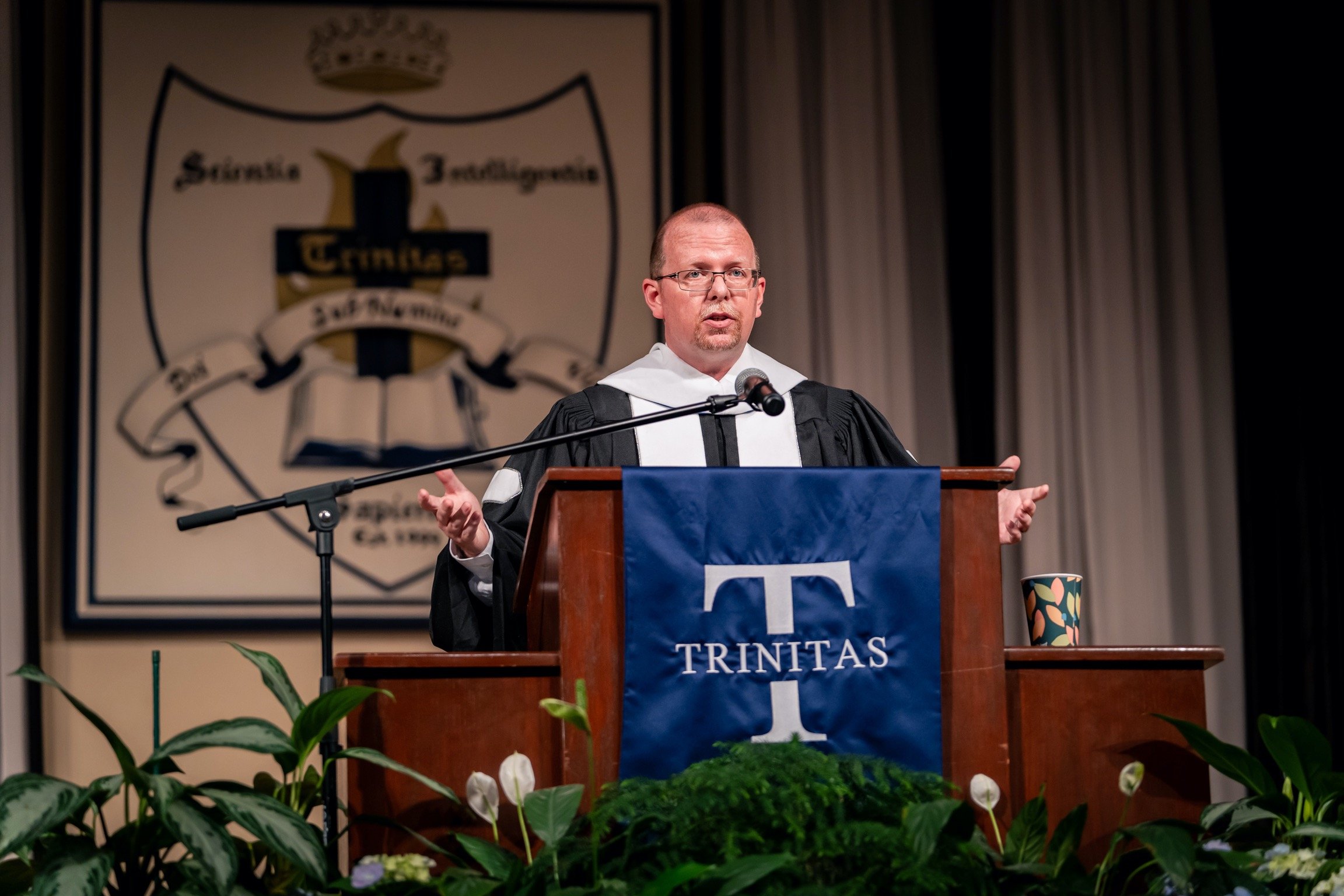One of the great challenges for a Classical Christian school has always been navigating the world of college admissions. What we do in the classroom sounds foreign to admission officers who have reviewed thousands of applications from the Industrial-Model Public School which is prevalent today. Translating what we do at a school like Trinitas has long been something of a Herculean task, but we have made it work.
Sean Hadley
Recent Posts
There is a passage from Ray Bradbury’s Dandelion Wine that I reflect upon at the end of every Summer. It comes as the main characters, two brothers of Logic school age, are realizing that this season of their life is coming to an end:
And they left the mellow light of the dandelion wine and went upstairs to carry out the last few rituals of summer, for they felt that now the final day, the final night had come. As the day grew late they realized that for two or three nights now, porches had emptied early of their inhabitants . . . and surely when they abandoned the conflict the war with Time was really done, there was nothing for it but that humans also forsake the battleground. (p. 281)
Summer has always felt like that to me, like “a war with Time,” where every moment is grasped tighter. This is why I always tell students that Summers are Sacred. It is a kind of Sabbath, a season when we labor through rest.
Topics: Blog Posts, Parenting, Parent Involvement, Reading, Virtue
Kurt Vonnegut gave a commencement speech towards the later end of his career, and he advised that all such speeches should begin with a joke. I toyed around with possibilities for this venue, including the much beloved green ping pong ball joke, the always-appreciated purple kingdom joke, and the new-to-many-of-you story about lil’ Johnny and the Noodle Man. However, none of them seemed quite right for the occasion, so I thought I’d do something completely different: let’s start tonight by defining our terms. I promise if you’ll bear with me, that this will be over quickly.
Topics: Blog Posts, School Life, Classical Education, Alumni, True Education
There is a great scene in Margery Williams’s 1922 children’s story The Velveteen Rabbit. The titular character begins questioning the old “Skin Horse” about the process of transforming from a mere toy into something more real. As the Horse explains:
“It’s a thing that happens to you. When a child loves you for a long, long time, not just to play with, but REALLY loves you, then you become Real."
“Does it hurt?” asked the Rabbit.
“Sometimes,” said the Skin Horse, for he was always truthful. “When you are Real you don’t mind being hurt.”
“Does it happen all at once, like being wound up,” he asked, “or bit by bit?”
“It doesn’t happen all at once,” said the Skin Horse. “You become. It takes a long time. That’s why it doesn’t often happen to people who break easily or have sharp edges, or who have to be carefully kept. Generally, by the time you are Real, most of your hair has been loved off and your eyes drop out and you get loose in the joints and very shabby. But these things don’t matter at all, because once you are Real you can’t be ugly, except to people who don’t understand.”
I always think of this conversation when I asked my opinion on writing in books.
Topics: Blog Posts, Studying, Reading
Have you ever tried to quote someone, but ended up having to spend more time explaining how you’re probably getting it wrong from the outset? Has a conversation ever provoked a memory for you of something you once heard, and you’re certain it is relevant to the moment, but for the life of you, the words will simply not come when called? Such gaps in memory are a normal part of the everyday experience for most of us. And in the heat of the moment, we’re often tempted to turn to the nearest search engine, sometimes a bit chastened by having to rely on such an outside source. And it is this last part that might make you wonder, “what did people do before Google?”
Topics: Blog Posts, School Life, Studying, Classical Education, Reading, Truth, Goodness, and Beauty
We’ve spent the last two weeks thinking about the dominant form of grades used in schools today, the history and effects of that system, and why they are not the ideal for a classical Christian school.
Bear with me one more time as I recall our pitching metaphor. A coach who tells a young pitcher that they threw a “C+” pitch is not providing much help. And the young pitcher who interrupts a coach’s instruction to ask, “Yeah, but did I pass?” might be riding the bench for a while. Why? Because we understand intuitively that constructive feedback is about more than a graded evaluation.
Topics: Blog Posts, Classical Education, True Education, Teaching, Grades, Virtue
As we saw last week, the modern grade scale is a fairly recent development in education and not one that has a long history of success or stability. This week we will look at how grades are perceived to function which has important implications for a Christian classical school.
The purpose of grades in a classroom, under the A–F system, is to pass judgment through a numerical evaluation. This gives the notion of impartiality and objectivity while mitigating the force of the judgment. We pass judgment every day, of course, regarding what shoes to wear, what route to take to work, and even what to say to our boss. Judgment is an inescapable part of the human experience. But there is no denying: we do not like feeling “judged.”
Topics: Blog Posts, Classical Education, True Education, Teaching, Grades, Virtue
Imagine a World Without Grades. You Can Do It If You Try.
Imagine you are a young pitcher, standing on the mound of your first Varsity baseball practice. You throw the ball to the catcher, and your coach proceeds to tell you that it was a “C+” pitch. What would you think? The example seems ludicrous to us because we know what the young man needs: pointed, specific guidance so that he can improve the pitch. We know intuitively that the letter, in this case, is unhelpful.
Now imagine the same scenario from a slightly different angle. You are the coach. As you approach the mound and begin explaining to the student how to use their shoulders as they throw, you are suddenly interrupted. “Yeah, but did I pass, Coach?” You can imagine the frustration in this similarly absurd example. “A student would never say that!” you think to yourself. And you’re right; they would not. Again, this is intuitive; there doesn’t even seem a need to explain it. Similar scenarios could be played out ad nauseum, with different actors substituted in to show that applying a percentage system of grading to life is unhelpful at best and downright dehumanizing at worst. So why does this same proposal meet with such hesitancy when applied to the classroom?
Topics: Blog Posts, Classical Education, True Education, Teaching, Grades, Virtue








